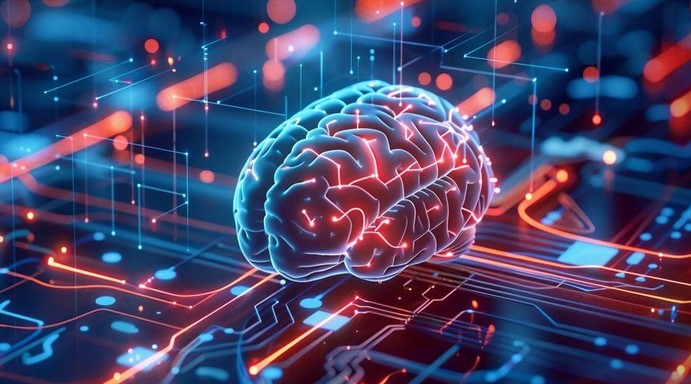
The convergence of quantum computing and artificial intelligence (AI) has sparked excitement across various industries, creating the potential for revolutionary advancements. The future of quantum AI promises to unlock new levels of intelligence, problem-solving capabilities, and computational efficiency. Quantum AI combines the strengths of quantum mechanics and machine learning to push the boundaries of what is possible with classical computing. As quantum hardware improves and AI algorithms evolve, we are entering an era where these two powerful technologies can fundamentally transform industries ranging from healthcare and finance to logistics and cybersecurity. In this article, we explore the promising future of quantum AI, its potential applications, and the challenges that lie ahead.
What is Quantum AI?
Quantum AI is the fusion of quantum computing and artificial intelligence. Quantum computing leverages the principles of quantum mechanics, such as superposition and entanglement, to perform calculations at speeds unimaginable with classical computers. AI, on the other hand, uses algorithms and data-driven models to enable machines to learn, reason, and make decisions without human intervention.
By combining quantum computing with AI, we open the door to solving problems that were previously intractable. Quantum computers can process vast amounts of data simultaneously, vastly improving the speed and efficiency of AI algorithms. This could lead to breakthroughs in machine learning, optimization, and even the development of new types of intelligent systems that adapt to changing conditions in real time.
How Quantum AI Works
At the heart of quantum AI is the quantum computer, which operates using quantum bits or qubits. Unlike classical bits, which can only represent a 0 or 1, qubits can exist in multiple states simultaneously due to the principle of superposition. This allows quantum computers to handle complex problems by processing vast amounts of information at once.
In the context of AI, quantum computers can accelerate certain machine learning tasks. For instance, quantum algorithms can potentially improve the speed of training models, leading to faster decision-making in applications like natural language processing (NLP), image recognition, and predictive analytics. Quantum-enhanced machine learning could also be used to tackle optimization problems—such as finding the most efficient solution to logistical or financial problems—at a scale and speed that classical algorithms struggle to achieve.
Key Applications of Quantum AI
As we look to the future of quantum AI, several industries stand to benefit from the unique capabilities offered by quantum computing in combination with AI. Here are some of the most exciting areas where quantum AI is expected to make a significant impact:
1. Healthcare: Revolutionizing Drug Discovery and Personalized Medicine
One of the most promising applications of quantum AI lies in healthcare, specifically in drug discovery and personalized medicine. The process of designing new drugs is incredibly complex, as it requires simulating and testing a vast number of molecular interactions. Classical computers struggle to model these interactions accurately due to the sheer computational power required.
Quantum AI, however, could accelerate drug discovery by simulating molecular interactions at an atomic level. This would not only speed up the identification of new drugs but could also make the process more cost-effective. Additionally, quantum AI could be used to personalize treatment plans based on individual genetic profiles, optimizing healthcare outcomes for patients.
2. Finance: Enhancing Predictive Analytics and Risk Management
The financial industry could see a dramatic transformation from the future of quantum AI. Quantum computing’s ability to analyze vast amounts of data quickly could be used to enhance predictive analytics, enabling financial institutions to make more accurate market predictions and optimize investment strategies.
Moreover, quantum AI could significantly improve risk management by providing more accurate modeling of complex financial systems. With quantum-enhanced machine learning, financial institutions could better predict market shifts, identify potential risks, and even design more efficient algorithms for algorithmic trading. This could reduce uncertainty in the financial markets and improve the stability of the global economy.
3. Logistics and Supply Chain Optimization
Quantum AI also holds great potential in optimizing supply chains and logistics. The complexity of managing global supply chains, especially in industries like manufacturing, transportation, and retail, often involves handling massive amounts of data related to inventory management, demand forecasting, and route optimization. Quantum computing could significantly improve optimization algorithms, enabling companies to find the most efficient solutions to these problems in real time.
By leveraging quantum AI, businesses could optimize transportation routes, reduce operational costs, and minimize delays, leading to more efficient supply chains and better customer service. This would be particularly beneficial for industries like e-commerce, where fast delivery times are critical to customer satisfaction.
Challenges and Barriers to Overcome
Despite the exciting possibilities of quantum AI, there are several challenges that must be addressed before the technology can be widely implemented. These challenges include hardware limitations, algorithmic development, and the need for skilled professionals in the field.
1. Quantum Hardware Limitations
The development of quantum hardware is still in its early stages. Quantum computers are highly sensitive to their environment, and qubits are prone to errors due to factors like temperature fluctuations and electromagnetic interference. To harness the full potential of quantum AI, these hardware challenges must be overcome, and quantum computers need to be made more stable, scalable, and error-resistant.
Currently, only a handful of companies and research institutions have the resources and expertise to build and maintain quantum computers. As quantum hardware continues to improve, more access to quantum computing will become available, enabling broader adoption of quantum AI applications.
2. Developing Quantum Algorithms for AI
While quantum hardware is essential, quantum algorithms tailored to AI applications are just as important. The development of algorithms that can effectively leverage quantum computing’s power is a complex and ongoing challenge. Quantum machine learning algorithms must be designed to handle the probabilistic nature of quantum systems while ensuring that the benefits of quantum speedup are realized.
Researchers are still in the process of developing practical quantum algorithms that can be applied to real-world AI tasks. While progress is being made, there is still a long road ahead before quantum AI algorithms can be standardized and optimized for various industries.
3. Talent and Expertise Gap
The future of quantum AI depends not only on advances in hardware and algorithms but also on the availability of skilled professionals. Quantum computing and AI are highly specialized fields that require expertise in both quantum mechanics and machine learning. As the demand for quantum AI grows, there will be an increasing need for scientists, engineers, and developers with a deep understanding of both quantum physics and AI algorithms.
Bridging the talent gap will require investment in education and training, as well as collaboration between academia, industry, and government.
In conclusion, the future of quantum AI holds the promise of unlocking new frontiers in intelligence, problem-solving, and computational efficiency. By combining the power of quantum computing with the sophistication of AI, quantum AI is poised to transform industries such as healthcare, finance, and logistics, enabling breakthroughs that were once thought impossible. However, significant challenges remain in terms of hardware development, algorithm optimization, and talent acquisition. As these hurdles are overcome, we will see quantum AI play an increasingly important role in shaping the future of technology and the way we interact with the world around us. The potential for quantum AI is limitless, and we are just beginning to scratch the surface of what this powerful fusion of technologies can achieve.
